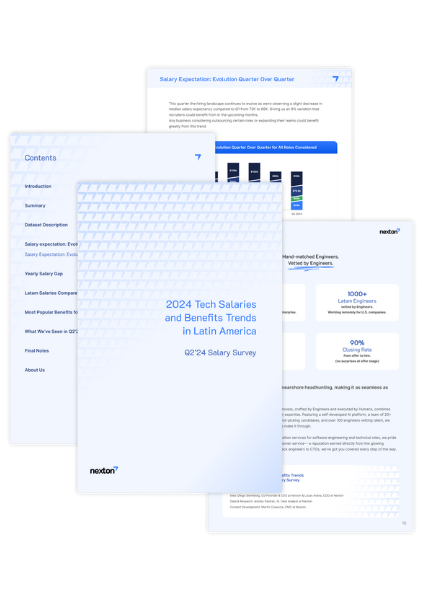Getting your dream job at a US startup can be challenging and different from interviewing for a local company. You will also be competing with candidates from all over the world, some of whom might have been preparing for months for this particular job.
US companies expect you to be really prepared and be able to articulate your thoughts and reasons you want to work at that company from day one. There are multiple screening rounds involved, and you have to put your best efforts into preparing for the role and getting ready for an interview to impress the recruiters.
You might not be used to the way US tech companies conduct interviews and what they expect from you. You need to be confident, aware of your skills, and present yourself as the best fit for the job.
Every interview starts with a screening process followed by personal and panel interviews that evaluate your cultural fit and technical expertise.
Types of Interview Rounds
The most common types of interview rounds you will be attending are:
Screening Calls
These are usually held through a remote call where the interviewer will verify your background information and assess whether you satisfy the basic fit criteria for the job role under consideration. These calls typically last for around 20 to 30 minutes.
The interviewer gathers necessary information like your personal data, experience, qualifications, and skillset and evaluates it against the job role to decide to either proceed with your profile discard it in case of a mismatch.
Cultural Fit Evaluation
The cultural fit evaluation will be assessed throughout your interview process. It will include assessing your communication skills and testing whether your values, beliefs, and behavior fit with the company's culture. Some typical questions that may be asked include:
- Tell me about a recent project you feel proud of.
- Tell me about a difficult situation at work and how you solved it.
- Describe the type of work environment that you consider to be most productive.
- What do you do when your colleagues disagree with your ideas?
- Do you prefer working alone or as part of a team?
- Name three things that you like the most about our company.
- Describe any challenges you have faced at work and explain how you dealt with them.
Technical Interview
Assessing your technical skills relevant to the job is an integral part of the recruitment process. Technical interviews are done to evaluate your skills and capability. They will consist of various tests, interview questions, and methods like whiteboarding, peer programming, and online quizzes that help the interviewers understand your skill. The best way to attend these interviews is to be prepared, take some practice tests, and hone your technical skills.
Panel Interviews
When you move on to the advanced stages of the recruitment phase, it is common practice to be interviewed by a panel. These are called panel interviews, where you will be interviewed by a group of interviewers from different departments and a hiring manager. The interview questions could be asked from various fields and even constitute a stress interview scenario that assesses your performance under duress.
Besides the usual preparations that go into getting ready for the job, like honing your technical skills, you also need to pay attention to the overall interview etiquette required and be able to show yourself as the right fit for the organization's culture and work processes.
Tips To Help You Prepare Yourself For Your Dream Job
Research The Company You Interview For
Start by learning everything you can about the product and the company. Showing a genuine interest in the company's vision and being able to articulate your observations about their product when given a chance will put you in a good light.
You should also look into the startup's story, its founders to better understand the future goals and scope. Be curious about the company, and if given a chance, ask the interviewer of any questions and queries you might have come across when researching for the product. Usually, it will be an engineer, senior engineer, or a hiring manager who will be interviewing you. So ask questions relevantly.
You can try looking up the company, its founders, and senior executives on professional networking sites like LinkedIn, CrunchBase, the company's website, Glassdoor reviews, and more.
Be Confident And Ready To Show Off Your Skills
Humility and humbleness may be revered values in your culture. But when you have to appear for an interview for a skilled tech role for a US company, being humble about your accomplishments may end up making you look incompetent.
Compile a list of all your key achievements and skills. Narrow down this list to 5 top skills, prioritizing relevant skills to the job in question, and remember to highlight them as and when you get the opportunity to throughout the interview.
Be confident about your skills, and do not shy away from explaining your team's contributions in your current workplace and previous job roles. Own up to your achievements and be sure to mention them with confidence.
The right way to sway the interviewer to see your positive strengths is to highlight your top 5 skills throughout the interview and remind the interviewer why you are the best fit for the job.
Present Yourself Appropriately
While startups may have a relaxed dress code in their workplace, it is still advised to follow a conservative business attire when you appear for an interview either in person or by remote video conferencing channels. A professional appearance shows that you take the interview seriously and will be committed to the work requirements.
For remote interviews, make sure you have the interview set up ready with a proper and stable internet connection, adequate equipment, a good background, a quiet and well-lit space, and test your equipment like mics, video cam, and speakers properly before starting the interview. Do maintain a checklist to ensure you get all of these setups and ready to go before the interview begins.
Remember that first impressions do matter a lot. So make sure to pay attention to the first few seconds of the interview and start strong. Appear confident and be prepared with a solid introduction that highlights your best skills and top achievements.
Be Engaged
Exhibit a genuine interest during the interview and avoid being passive. Be attentive and interactive. Make sure to clarify discussions when you don't understand them with simple questions like 'Can you explain that?' or by reiterating the points narrated by the interviewer.
Do not fear coming off as rude and refrain from asking questions. Listen, and ask to repeat if you don't get it. Not doing so and having a vague understanding will make it harder for you to answer back and show you as someone who is not engaged in the interview.
Smart people may not have the best answers but will have the best questions, and potential employers will be quick to notice your smartness via your questions.
Develop Communication Skills
As a person interviewing for a second language other than your mother tongue, you may find it challenging to get used to long conversations during the interview. So try to practice at home with sample interview questions.
The Spanish language has different words for denoting formal and informal conversations. But in English, there is just one word, 'You' to denote the second person. So you may get confused and tend to fall back to a non-formal way of speaking as you try to talk in English.
Pay attention to your tone and speaking style. While you can come off as confident, make sure you respect the interviewer and follow a formal conversation. If your interview is held in Spanish, stick to using 'usted' during the interview.
Be Ready To Deal With Impersonal Interviewers
Most American interviewers will not ask personal questions about your background, family, kids, or personal preferences. They like to keep the interviews precise and focused on your professional aspects only. There are many reasons for this, including the legal restrictions as asking personal interview questions is prohibited unless initiated by the candidate.
As they are bound by law not to ask personal questions, you should also refrain from getting too personal in an interview. Most interviewers might come off as unemotional and impersonal, so don't take it to be a sign of disinterest in your profile.
Prepare Yourself Well For The Commonly Asked Questions
- Tell Me About Yourself
The very first question you may come across in most interviews would be to tell about yourself. When asked this question, try to stick to your professional information, giving details about your career, skills, educational qualifications, and relevant work experience. Avoid giving out personal information.
- What Makes You Interested In The Job
This is the question where you apply your research on the company and product and list out the reasons you want to be hired for the role. You can talk about the professional challenge you expect from the job, the chances to advance your career, and so on.
- Why Should We Hire You
This answer ought to convince the recruiters why you are a good fit for the job. So carefully layout your skills, accomplishments, and why you feel you are an excellent match for the position.
You can also give information about your professional background and your overall work experience and talk about your expertise to help the organization. As mentioned earlier, be assertive about your accomplishments and show off your achievements. While this can be awkward for Latin Americans who place more importance on community rather than individuality, it is a needed quality most US startups will be looking for.
- Explain your strengths
These could be your team-spirited work nature, your attention to details, your communication skills, and problem-solving skills. When you talk about your weaknesses, describe them honestly, and also mention the production steps you are undertaking to overcome your weaknesses. You can also incorporate the things you are trying to improve and mention how much you have progressed so far.
- Tell me about a project you are incredibly proud of?
When you talk about the projects you have worked on, try to focus on those that are most relevant to the job you are applying for. Prepare a list of the top 5 projects that you can relate to the goals of the company. As mentioned earlier, a little bit of research can help you find the company's current vision, values, and expectations. Practice listing out your key achievements in a way you are capable of listing them all within 60 seconds.
- Tell me about a time when you overcame a challenge at work?
You should also highlight your key achievements throughout the interview as you talk about your strengths and the challenges faced. Highlight the techniques, learnings, and the success attitude you developed throughout your work experience and explain how they helped you face your challenges and get better results.
- What Is The Salary You Expect
This can be a tricky question. But most often, you will need more information to answer this question with confidence and can give out answers such as:
I'll need more information on the job responsibilities before getting to the salary discussion
My salary expectations are in line with my qualifications and education, and I'm sure your company offers a fair, competitive salary for someone with my experience.
So, these were just a few recommendations that will help you prepare for an interview with a US startup. What are your views on this? Do let us know in the comments below.
At Nexton, we make sure to optimize each recruiting process, ensuring a fair process where the best candidate gets selected for the specific job. We are here to support you throughout the process, so feel free to reach out to us for any queries and guidance to help prepare for your interviews.



